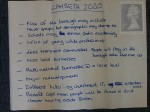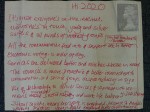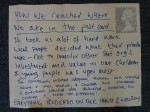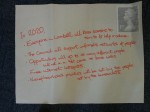Lambeth Council held the second in a series of ‘Future Thinking’ events at the Town Hall in Brixton on the 27th March. Future Thinking events allow people to share ideas across organisations and between professionals and residents, building capacity and stronger networks as we go.
The topic for this event was cohesion and resilience. Lambeth’s cooperative ambitions are founded on the idea that the council can work in partnership with residents, and that power can be devolved to communities, giving them greater freedom to shape their own lives. There is recognition, therefore, that a cooperative borough needs resilient communities that have the capacity to participate.
Most people will think of resilience as being able to bounce back from damaging events, but for Lambeth resilience means more than that. It means being flexible and having the ability to adapt to changing circumstances, be they evolutionary changes or sudden changes. This applies to both individuals as well as to communities. This event brought people together to discuss the strength of Lambeth communities, what resources there were to build cohesion and resilience, and what circumstances might threaten that resilience.
On the night it was a great turn out with a vibrant crowd who got involved in the workshops and listened to two superb and thought provoking presenters. First up was Nicola Bacon from the Young Foundation who presented findings from the Local Wellbeing Project, where they have explored the meaning of wellbeing and how is it best measured, delving deeper into communities rather than just looking at deprivation statistics. One of the key findings from their research is that an individual’s resilience is key to their wellbeing and the extent to which they are able to thrive. The Young Foundation have taken practical steps to pilot teaching resilience in schools with interesting results. On a larger scale, the YF have tried to understand why different communities with similar socio-economic profiles can have very different outcomes. They argue that policy that focuses on wellbeing and resilience can improve other outcomes such as educational achievement, community engagement and parenting support.
More information on Nicola’s research can be found here: http://www.youngfoundation.org/publications/books/the-state-happiness-january-2010
The second presentation was by Max Wind-Cowie from Demos. He presented findings from research carried out on ‘pride and patriotism’, explaining that there is disconnect between political narratives of patriotism and ordinary citizens’ pride in Britain. Max explained how the data he had gathered suggested that pride does not come from top down narratives such as the royal family, or progressive values. Rather, modern British patriotism is founded in a emotional connection to the everyday acts, manners and kindnesses that British people see in themselves; pride and patriotism are hyper-local. This is important for those thinking about how to engage communities and boost participation. Those who love their country or their locality, for example, are likely to volunteer more and to trust their neighbours more than those who are either ambivalent or ashamed about Britain and their locality.
For more on his research, follow this link: http://www.demos.co.uk/publications/aplaceforpride
Between the two presentations we conducted two workshop exercises where we invited people to explore the themes of cohesion and resilience in more detail. Firstly we asked people to identify examples of community resilience in Lambeth, thinking about areas where it is strong, and where it is under threat due to changes in the political and economic landscape. We then invited people to record these examples on large maps of Lambeth, adding a geographic dimension. Some of the examples identified were:
|
Strong examples |
Examples under threat |
|
|
In the second workshop we asked people to discuss what it means to belong in Lambeth and how this is changing over time. Building on the examples identified in the first session, we asked what people thought Lambeth’s communities might look like in the future, and what can be done now to influence it. Participants recorded their conversations as a ‘postcard from the future’ to people in the present day, outlining what Lambeth is like in 2020 and what happened to get there. People were very imaginative with this and we got some interesting feedback, photos of these postcards can be seen below:
The next Future Thinking event will take place soon and the topic is Localism, and what this will mean on a practical level for both residents and public services. Invites will be sent out shortly. If you wish to discuss any aspect of this event in more detail, please contact Nathan Pierce in Lambeth Council on 0207 926 6917.












 Posted by nathanpierce1
Posted by nathanpierce1 